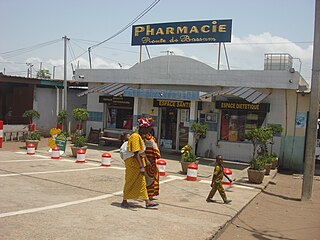
Back فرنسية إفريقيا Arabic África francófona AST Afrika franca Esperanto Aafrika prantsuse keel Estonian فرانسوی آفریقایی Persian Afrikanranska Finnish Français d'Afrique French צרפתית אפריקאית HE Աֆրիկյան ֆրանսերեն Armenian Ափրիկեան ֆրանսերէն HYW
This article has multiple issues. Please help improve it or discuss these issues on the talk page. (Learn how and when to remove these messages)
|
| African French | |
|---|---|
| français africain | |
 A private pharmacy in Abidjan, Ivory Coast | |
| Region | Africa |
Native speakers | 320 million (mostly non-native speakers) (2024)[1][2][3] |
Early forms | |
| Dialects |
|
| Latin (French alphabet) French Braille | |
| Official status | |
Official language in | Countries and territories |
| Language codes | |
| ISO 639-3 | – |
| IETF | fr-002 |
 2024 situation in Africa of the French language as official language, and native language regions. | |
 |
| Part of a series on the |
| French language |
|---|
| History |
| Grammar |
| Orthography |
| Phonology |
African French (French: français africain) is the generic name of the varieties of the French language spoken by an estimated 320 million people in Africa in 2023 or 67% of the French-speaking population of the world[1][2][3] spread across 34 countries and territories.[Note 1] This includes those who speak French as a first or second language in these 34 African countries and territories (some of which are not Francophone, but merely non-Francophone members or observers of the Organisation internationale de la Francophonie or OIF), but it does not include French speakers living in other African countries. Africa is thus the continent with the most French speakers in the world,[4][5] and African French speakers now form a large and integral part of the Francophonie.
In Africa, French is often spoken as a second language alongside the Indigenous ones, but in a small number of urban areas (in particular in Central Africa and in the ports located on the Gulf of Guinea) it has become a first language, such as in the region of Abidjan, Ivory Coast,[6] the Democratic Republic of Congo,[7] in the urban areas of Douala, Yaoundé in Cameroon, in Libreville, Gabon, and Antananarivo[8]
In some countries, though not having official de jure status, it is a first language among some social classes of the population, such as in Algeria, Tunisia, Morocco, and Mauritania, where French is a first language among the upper classes along with Arabic (many people in the upper classes are simultaneous bilinguals in Arabic/French), but only a second language among the general population.[9]
In each of the Francophone African countries, French is spoken with local variations in pronunciation and vocabulary.
- ^ a b "327 millions de francophones dans le monde en 2023" (PDF). Archived (PDF) from the original on 2023-04-15. Retrieved 2023-04-15.
- ^ a b "En 2023, 327 millions de personnes parlent français dans le monde, dont près de la moitié en Afrique". Archived from the original on 2023-06-06. Retrieved 2023-04-15.
- ^ a b "Accueil-Francoscope". Archived from the original on 2023-03-23. Retrieved 2023-04-15.
- ^ Organisation internationale de la Francophonie (OIF). "La langue française dans le monde" (PDF) (2019 ed.). p. 38. Archived (PDF) from the original on 2020-12-03. Retrieved 2020-11-24.
- ^ Chutel, Lynsey (18 October 2018). "French is now the fifth most spoken world language and growing—thanks to Africans". Quartz Africa. Archived from the original on 2020-11-08. Retrieved 2020-09-30.
- ^ (in French) Le français à Abidjan : Pour une approche syntaxique du non-standard Archived 2016-01-20 at the Wayback Machine by Katja Ploog, CNRS Editions, Paris, 2002
- ^ "Evidence from the Democratic Republic of the Congo" (PDF). IDRC CRDI. Retrieved 21 December 2024.
- ^ Øyvind, Dahl. "Linguistic policy challenges in Madagascar" (PDF).
- ^ Benrabah, Mohamed (2007). "Language Maintenance and Spread: French in Algeria". International Journal of Francophone Studies. 10: 193–215. doi:10.1386/ijfs.10.1and2.193_1. Archived from the original on 2024-05-25. Retrieved 2024-03-18 – via ResearchGate.
Cite error: There are <ref group=Note> tags on this page, but the references will not show without a {{reflist|group=Note}} template (see the help page).